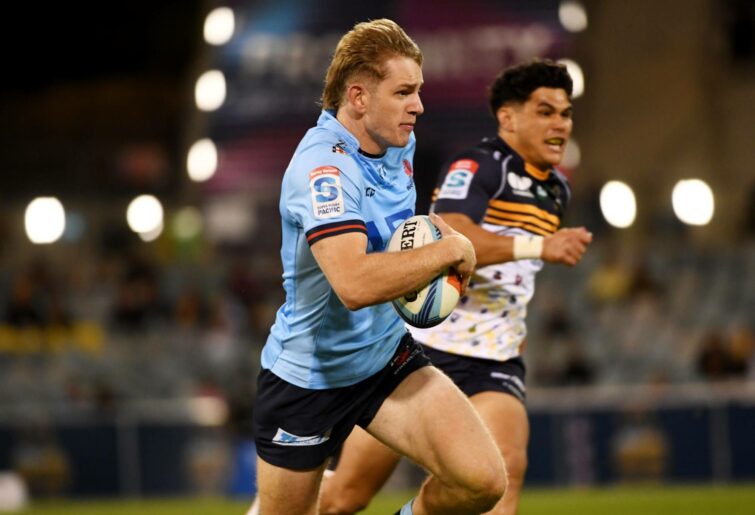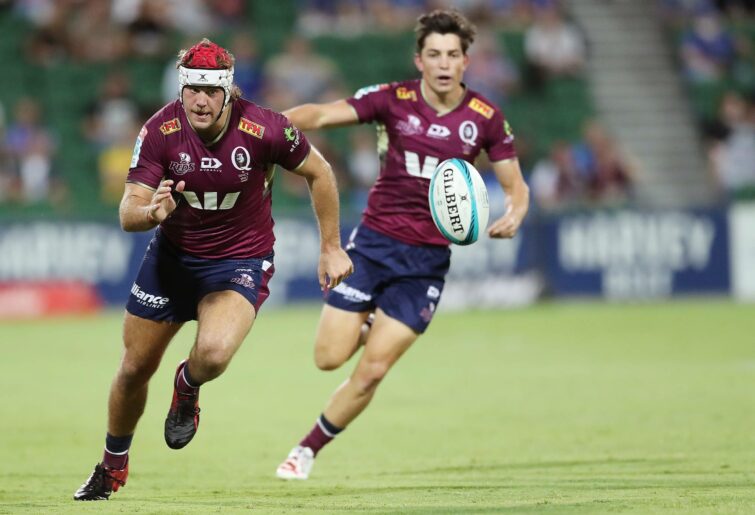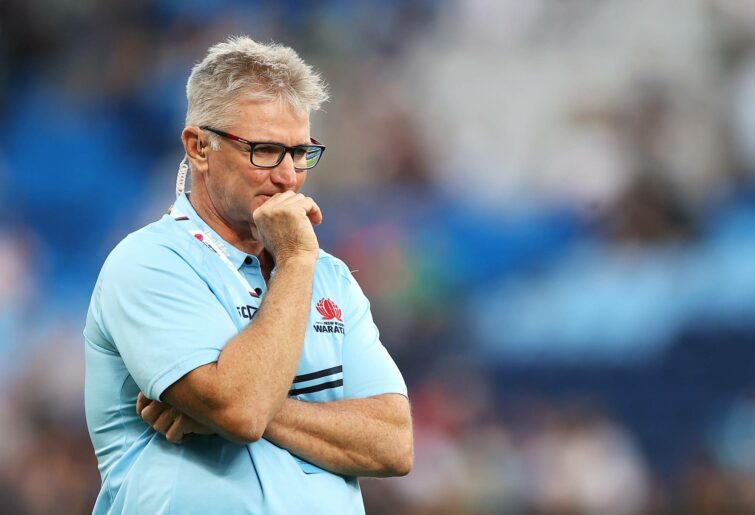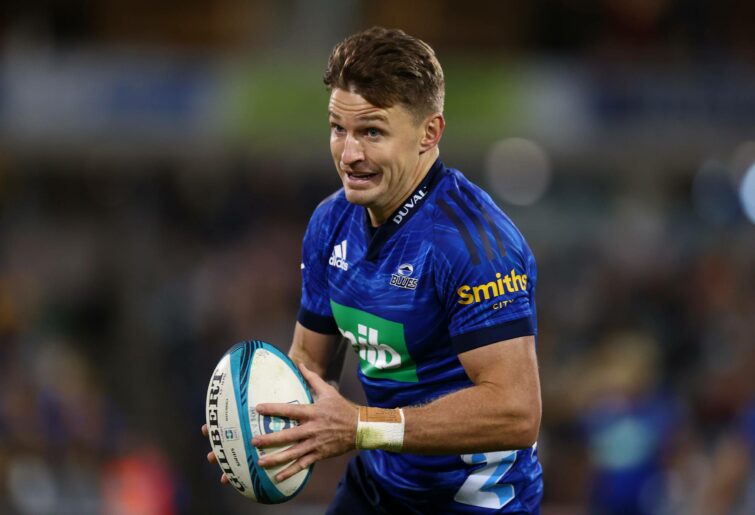Moreso than the continued domination of New Zealand franchises, one of the things ailing Super Rugby in 2023 is the predictability of outcomes.
Both the NRL and the AFL seasons to date have been notable for the number of surprise results, and while the cliché of any side being able to beat any other side on any given day isn’t quite true, they are a damn sight closer to that truth than where Super Rugby currently sits.
After seven completed rounds, 40 matches in total, only one result, the Fijian Drua’s 25-24 win over the Crusaders in Round 3, can be counted as a genuine shock. Without exception, every other match has either gone to the overwhelming favourite, or been a 50-50 match where a surprise result wasn’t a factor.
There’s even a case to be made to mark down every home match in Fiji as a win for the Drua, Crusaders or not. It was interesting to hear from Rebels players during the week about just how oppressive and stifling the conditions were for them last week, with one player stating that it was the most difficult match he’d ever played in.
What about the Brumbies’ 25-20 win over the Blues during Super Round? Well, surely Australia’s best team beating New Zealand’s third-best team can’t be considered a shock. Although rare, it isn’t actually unheard of for Australian teams to win the odd match against Kiwi opposition!
Of course, it’s not essential that there be unpredictable results, but for a competition continuing to attract and hold eyeballs, there’s no doubt it helps. Unlike other leagues, Super Rugby isn’t subject to a draft, where sides languishing at the bottom of the ladder get an opportunity to strengthen their roster.
That’s yet another indicator of how closely the New Zealand and Australian national unions hold Super Rugby to their chests. A genuinely competitive professional franchise competition is nice, but not as nice as winning Test matches and World Cups, it seems.
In lieu of any competition-wide equalisation measures, it’s simply up to the bottom franchises to get better with what they’ve got, and if they aren’t able to attract players from the better franchises, be innovative in how they go about finding and adding players from overseas. And get lucky.

(Photo by Tracey Nearmy/Getty Images)
For any smart-alecs asking, if Super Rugby is so free of upset results, why aren’t tipping panellists all running at 100 per cent or close to for the season, the answer is two-fold. One essential is to fall on the right side of the ledger in the genuine 50-50 matches.
The other is that tipping competitions are almost always won by people prepared to tip upsets. But for that to happen there firstly needs to be upsets, and when there are none, things can go awry.
As it happened, there were two ‘half-upsets’ on the weekend, with Moana Pasifika leading the Crusaders 21-17 at half-time, and the Rebels similarly up by 17-13 against the Blues.
In Christchurch, Moana Pasifika’s first half was outstanding, built off the back of crisp ball movement and direct, hard running by their strike players, Levi Aumua and Timoci Tavatavanawai.
Here was a lesson for all underdogs, writ large; the value of self-belief, not letting the so-called senior partner dictate terms just because that’s what everyone expects.
But that’s another differentiator between the top and bottom franchises; bench depth, and the ability to play out a consistent 80 minutes. Like the Rebels would the following night, Moana Pasifika failed to add a point in the second half, the Crusaders closing things out 38-21.
Because the issue of head injury isn’t going to go away, two incidents from the match warrant further discussion. In the 15th minute Jack Goodhue was removed for an HIA (and didn’t return to play) after a collision with Moana Pasifika’s Sam Slade. For a 19-Test All Black, Goodhue’s technique in the tackle was concerning, placing his head in front of a charging Slade instead of to the side.
But with tackling players encouraged to bend at the hips and keep their heads and shoulders well away from their opponent’s head and neck, just as Goodhue did, where does the responsibility start for the ball carrier to protect the tackler?
Upon entering contact, Slade noticeably ducked and led with his head, and can be argued to have been the primary cause of the head clash. While World Rugby’s focus is rightly on tackling players to avoid such contact, there surely must also be more responsibility placed on ball carriers to retain a ‘normal’ running position and not adopt the billy-goat, battering ram pose Slade did.
On the other hand, there can be no doubt about the responsibility placed on Crusaders flanker Sione Havili Talitui not to swing his upper arm high into a tackle. Incredibly, his second half effort somehow avoided the scrutiny of all match officials, although he cannot expect to be so lucky when the citing commissioner gets into his work reviewing the weekend’s action.
Another high shot dominated discussion after the Reds’ 24-52 loss to the Brumbies; Angus Blyth inexplicably charging into Corey Toole, head first, after Toole had kicked the ball. Clumsy, reckless, idiotic… it was all of those things and Blyth’s spell on the sideline will be well deserved.
In some respects, the score-line felt unfair on the Reds, particularly the hard-working Tate McDermott and Fraser McReight, but the Brumbies simply had more quality players who delivered over the whole match.

(Photo by Will Russell/Getty Images)
While there was a natural focus on players who missed Wallabies squad selection, it was one of the automatic selections, Rob Valetini, who stood tallest; hard-shouldered in defence and effectively hitting the ball up with monotonous regularity.
While we’re on the Wallabies squad, a ‘pet hate’ shout out for all of the reports over the weekend about Noah Lolesio being ‘snubbed’ by Eddie Jones. Lolesio wasn’t snubbed, he just wasn’t selected. Jones merely chose somebody else. If Lolesio had been announced in the squad, would that mean Carter Gordon or Ben Donaldson had been snubbed?
Considering the amount of rain that fell in Brisbane on match day, the match was of a quality higher than what might have been expected. It’s only a few short seasons ago that Australian derbies were largely unwatchable. For all of Super Rugby’s challenges, including the lack of unpredictability, at least that’s a trend appears to have been well and truly left behind.
Whatever one’s opinion of Brad Thorn as a coach, it was impossible not to feel for him in the moments after the match; swathed in abject disappointment, seemingly lost for any rational explanation about his side’s capitulation.
The problem for Thorn lies around expectation and the context of what has gone before. All of Darren Coleman, Kevin Foote and Simon Cron are in charge of teams that are coming from a lowly position. Even if their ladder positions don’t reflect it, the Waratahs, Rebels and Force are all better sides than they were last year, and all feel like they offer further improvement to come.

(Photo by Mark Kolbe/Getty Images)
Under Thorn, the Reds won Super Rugby AU in 2021. Their trajectory is downwards. Star prop and talisman Taniela Tupou isn’t returning next year. Despite players and coaches talking about the need for better discipline, the same boof-headed errors keep cropping up, week after week.
Thorn spoke like a broken man; one who, if a tap on the shoulder came this week, would accept his fate; grudgingly, but knowing fairly, that the end of a road had been reached.
After some spectacularly poor passages of play in the first half, the Hurricanes found their poise and purpose in the second, ending the Highlanders’ mini-run, 29-14.
Perhaps it was just one of those games, but the highlight for me was the assistant referee (‘touchie’ in the old money), putting his flag up when the ball wasn’t out, and sneakily taking it down again thinking nobody had noticed.
What he hadn’t counted on was sharp-eyed referee Damon Murphy – acutely aware that World Rugby is in the final stage of assessment prior to announcing its World Cup roster – being all over him like a cheap kaftan and, being the stickler for the laws that he is, whistling up play.
On Saturday night, there was a lot to like about how the Rebels withstood concerted first half-pressure from the Blues and converted their own opportunities, to take a 17-13 lead into the break.
But it came at a cost; first Trevor Hosea then Jordan Uelese being carried off with serious leg injuries, albeit Uelese bravely hobbled on for long enough to deliver a vital line-out throw on the stroke of half-time, setting up a maul try for his skipper, Brad Wilkin.
Worse was to follow in the second half, with Pone Fa’amausili also limping off, and with prop Sam Talakai thrust into the unlikely role of line-out thrower, the Rebels couldn’t get or keep their hands on the ball.
With a mountain of possession and 67 per cent territory, Beauden Barrett smoothly got things rolling at first receiver and the Blues went in for the kill.

Beauden Barrett (Photo by Mark Nolan/Getty Images)
Not in need of any assistance, they were gifted some anyway, the sin-binning of Cabous Eloff for dropping a maul, necessitating uncontested scrums. For the third time in a few weeks, rugby’s most insidious and unfair law was triggered and, already ragged, the Rebels were forced to drop another player to play 13 v 15, or 5 v 7 in the backline.
Like Mick Byrne and Leon McDonald before him, Rebels’ coach Kevin Foote was forthright afterwards about the unfairness of the law and its disproportionate impact on the game, fairly asking the question, “When has any Super Rugby side deliberately faked injuries to facilitate uncontested scrums?”
The price being paid to protect against something that has never happened, and in a competition like Super Rugby, is unlikely to ever happen, is simply too high. Somebody, somewhere, in a position of influence must surely be watching and listening.
As well as he played, with a success rate of four from 10, Beauden Barrett’s goal-kicking remains a concern; moreso when early arrivals were treated to the sight of Zarn Sullivan’s silky left foot, stroking over goals from all points of AAMI Park.
Conceding 41 second-half points was a harsh outcome for the home side, but as much as events conspired against them, they also contributed to their own downfall. Reece Hodge kicking out on the full from the second half restart was a balloon burster and, needing to slow the Blues’ momentum and play more of the game on their own terms, 18 turnovers, most of them self-inflicted, killed off any chance of that.
Everybody understands that, at this level, nothing short of an 80-minute sustained effort, with needless errors eliminated, with the best players staying on the park, is going to get the job done against the best sides.
A sniff of an upset in 40 minutes of rugby is just that, a sniff. Until sides like the Rebels, Moana Pasifika and others develop the player depth, cohesion, maturity and self-belief to deliver over 80 minutes, then upset results are going to remain rare occurrences.
































































































